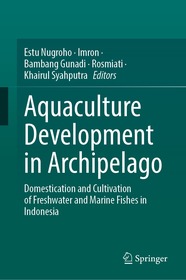
Aquaculture Development in Archipelago
Domestication and Cultivation of Freshwater and Marine Fishes in Indonesia
- Publisher's listprice EUR 213.99
-
88 752 Ft (84 526 Ft + 5% VAT)
The price is estimated because at the time of ordering we do not know what conversion rates will apply to HUF / product currency when the book arrives. In case HUF is weaker, the price increases slightly, in case HUF is stronger, the price goes lower slightly.
- Discount 12% (cc. 10 650 Ft off)
- Discounted price 78 102 Ft (74 383 Ft + 5% VAT)
Subcribe now and take benefit of a favourable price.
Subscribe
88 752 Ft

Availability
Not yet published.
Why don't you give exact delivery time?
Delivery time is estimated on our previous experiences. We give estimations only, because we order from outside Hungary, and the delivery time mainly depends on how quickly the publisher supplies the book. Faster or slower deliveries both happen, but we do our best to supply as quickly as possible.
Product details:
- Publisher Springer Nature Singapore
- Date of Publication 18 December 2025
- Number of Volumes 1 pieces, Book
- ISBN 9789819510832
- Binding Hardback
- No. of pages272 pages
- Size 235x155 mm
- Language English
- Illustrations II, 272 p. 117 illus., 113 illus. in color. Illustrations, black & white 700
Categories
Long description:
This book is a guide to domesticating and cultivating freshwater and marine fishes in Indonesia, offering a concise and comprehensive approach. It bridges the gap between theory and practice, equipping readers with practical techniques for success in the aquaculture industry. The book covers key topics such as breeding programs, nutrition management, disease prevention and sustainable aquaculture practices. It explores the diverse species found in Indonesian waters, providing valuable guidance on their unique requirements. Readers will find detailed case studies, step-by-step guides, and expert tips that enhance understanding and application. The book provides deep understanding of the principles and techniques involved, ultimately enhancing productivity and sustainability in the Indonesian aquaculture industry.
This book is intended for researchers, academics, fish farmers and aquaculture enthusiasts, and caters to both beginners and experienced professionals.
MoreTable of Contents:
"
.- Chapter 1_ Introduction.
.- Chapter 2_ Agroecological intensification of legume-cereal intercropping systems: The 4C approach.
.- Chapter 3_ Innovative cropping systems to maximize the use of available natural resources.
.- Chapter 4_ Enhancing the efficiency of light interception in soybean and maize intercropping system.
.- Chapter 5_ Mitigation of shading stress on soybean varieties through intercropping with maize.
.- Chapter 6_ Advanced soybean breeding techniques to alleviate biotic and abiotic stresses under intercropping.
.- Chapter 7_ Opportunities and challenges of greenhouses and soilless agricultural systems in combating food insecurity.
.- Chapter 8_ Using Fishponds Wastewater to Enhance Agricultural Crop Productivity and Sustainability.
.- Chapter 9_ Adaptation techniques to irrigation water shortages due to climate change.
.- Chapter 10_ Climate change effects on sustainable field crops production in Egypt: challenges and prospective.
.- Chapter 11_ AquaCrop model for simulating maize productivity with varying planting dates under deficit irrigation in the context of climate change.
.- Chapter 12_ Legume-based intercropping systems mitigate climate change.
.- Chapter 13_ Evaluating soil degradation processes and their exacerbation by climate change in the Nile Delta of Egypt.
.- Chapter 14_ Impact of climate change drivers on soil microbial communities and nutrient cycling in agricultural soils in the Nile Delta of Egypt.
.- Chapter 15_ Climate change impacts on crop yield prediction: A machine learning perspective.
.- Chapter 16_ Coupling process-based models with machine learning for robust predictions of soil, water, and crop dynamics.
.- Chapter 17_ Fusion of process-based models, machine learning, and remote sensing for yield gap assessment.
.- Chapter 18_ Conclusions, and Recommendations to “Resilient Agroecosystems: Innovations in Cropping Systems and Climate Change Mitigation”.




